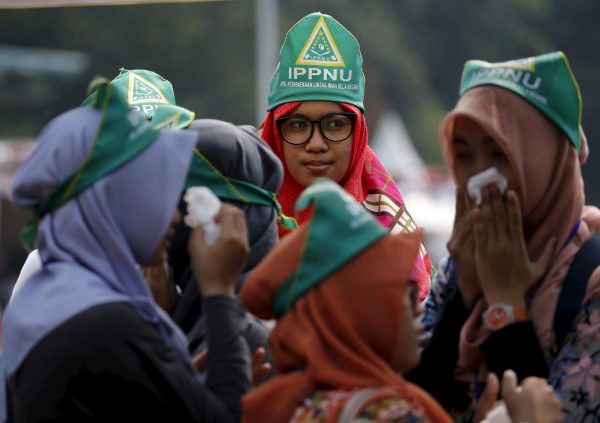The UN Secretary-General’s Preventing Violent Extremism Plan of Action identifies gender equality and empowering women as one of its seven priority areas for action, while Security Council Resolution 2242 calls for taking into account a gender perspective when framing all prevention responses.
How do gender and the diverse roles of women help to counter and prevent fundamentalist ideologies and violent extremism? One of our research participants answered this question with the following: ‘If you want to know what the security situation is, what the indicators of safety are, don’t ask the military, don’t ask the government, ask the women’.
That’s what research in Indonesia has sought to do. In 100 interviews and focus group discussions on women’s views about violent extremism, women, teachers, employees, religious leaders, students and members of civil society organisations in four sites selected for their variation with respect to urban/peri-urban/rural and conflict/non-conflict factors participants were asked about their perceptions and experience of fundamentalist ideology, extremism and violent extremism. They were questioned about the warning signs of rising extremism and terrorist violence and in what ways they have been involved in countering or preventing extremist behaviour. The maximum variation sample was structured to include areas across the country both in which there had been terrorist incidents and in which there had been none.
Indonesia — the world’s largest Muslim majority state, a state with a history of Islamic fundamentalism leading to conflict, but also with a strong democratic women’s movement — offers an important case in thinking about how to promote more effective anti-terrorism efforts in Asia.
Extremism — this research makes clear — is present everywhere and there is a strong connection between the spread of fundamentalist political ideologies or groups and rising extremism, including its violent forms. While women in the study generally opposed the use of violence, communities and public officials often condone fundamentalism.
Early warning signs of extremist violence can be detected in everyday behaviour that affects women. The signs include: changes in social attitudes to women’s and girls’ dress and veiling, restrictions on women’s mobility, use of ‘othering’, derogatory language, the exclusiveness of mosques and the advocacy of child marriage. While the restrictions imposed upon women and girls vary across locations, they are seen as a form of coercion associated with rising extremism. Observing and responding to the activities of Islamist groups in everyday life appears to be as important as responding to major terrorist attacks. Everyday violence, including violence that women and girls face, should be cause for alarm and needs to be pre-empted. Changes in women’s and girls’ freedom of dress and mobility should be systematically monitored at the community level as part of a comprehensive approach to preventing violent extremism as well as the promotion of tolerance and women’s rights.
There is also an impressive variety of ways in which women are individually and collectively acting to prevent violent extremism. Women are often first responders in their families and communities addressing extremism. One daughter convinced her father not to gender-segregate the Islamic boarding school he led. The Women’s School for Peace in Poso has developed a community warning system to prevent the escalation of inter-religious incidents into violence. There exists potential to scale up the support and finance for these activities. Women’s capacity to prevent and counter violent extremism extends far beyond their family roles. Many women-led activities remain ‘under the radar’, as do processes of radicalisation and recruitment into extremist networks more generally. Yet women’s leadership and authority within their families, workplaces and communities — including in state, religious, women’s and youth networks — itself represents a challenge to fundamentalist ideologies that script men as leaders and women as passive members of society.
Promoting gender equality is potentially the single most powerful counter to extremist interpretations of religion. One participant stated ‘if women are not actively involved in the debate, they would be overwhelmed by the gender-biased tafsir’ (interpretation of Islamic teachings). Women ulamas (religious leaders) are playing crucial roles in challenging extremist ideologies and individuals, as well as drawing on Islamic teachings and texts that promote tolerance and gender equality. Educating for gender equality within religious communities and organisations is also a crucial strategy for promoting a culture of tolerance and peace and encouraging resilient communities.
Investing in women’s participation can help prevent violent extremism in Indonesia and across the region. This is because women bring a distinct perspective and experience to ‘security’ — security is seen as encompassing both the family and community. Supporting women’s initiatives to identify and prevent extremist behaviour — through training and networking — may in turn encourage greater women’s participation in these initiatives. Enabling women and women-led organisations to participate in the development of strategies to prevent violent extremism can improve their effectiveness and broaden their reach.
At present, there is no explicit government or inter-governmental framework or institutional mechanisms for recognising and supporting the role of women in preventing violent extremism in Indonesia or in the region. An ASEAN Regional Action Plan on Women, Peace and Security that incorporated a range of threats to women’s security including violent extremism, conflict and natural disasters could mobilise and coordinate women’s participation in the development of strategies to prevent violent extremism and promote lessons learned across communities.
More effective, gender-inclusive national and regional counter-terrorism policies will likely help prevent violent extremism. Gender is a cross-cutting issue and governments should provide support for both international and national women’s organisations working to stabilise communities and prevent terrorism and violent extremism.
Jacqui True is an Australian Research Council Future Fellow, Professor and Director of the Gender Peace and Security Centre at Monash University.

